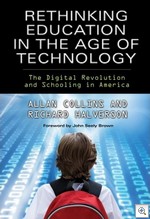Book review – Rethinking education in the age of technology
My goal for June: 30 days, 30 book reviews. Today’s book is Rethinking Education in the Age of Technology: The Digital Revolution and Schooling in America, by Allan Collins and Richard (Rich) Halverson. This book is a worthy addition to any school administrator’s nightstand and should be required reading in university educational leadership preparation programs or teacher education programs’ history of education courses.
What I liked about the book

Collins and Halverson state that our society already made the shift from an apprenticeship model of education to the universal schooling era. At present time we are living through a new shift: a move from universal schooling to an era of lifelong learning. This is resulting in big changes related to responsibility, expectations, academic content, pedagogy, assessment, location, culture, and relationships (see Chapter 6). The authors emphasize that the local school will not be replaced, but the role of new alternatives such as community-based learning centers where students and adults work side by side, workplace learning, home schooling, and virtual schooling “will make us rethink the dominant role of K-12 public schools” (pp. 3–4).
I liked how the authors devoted a chapter apiece to the arguments of technology enthusiasts (Chapter 2) and technology skeptics (Chapter 3). While they are admitted technology enthusiasts, I thought they did a pretty good job of presenting the opposing arguments fairly and thoughtfully, particularly when one also adds in Chapter 7, which addresses what we might gain and lose in a new educational paradigm. I also liked the discussion in the book about the growing disparity between the haves and the have-nots. As the authors note, “if educators cannot successfully integrate new technologies into what it means to be a school, . . . students with the means and ability will pursue their learning outside of the public school” (p. xv). We are not talking enough about these social justice / equity issues.
One of the key points of the book is that there are “deep incompatibilities” between current schooling practices and the “demands” of new technologies (p. 6). Significantly, the authors recognize that technology makes teachers’ work more difficult: it requires instructors to acquire new skills, undercuts the lockstep model of schooling, and undermines educators’ classroom expertise (p. 6). Many technology enthusiasts – including myself – often don’t pay enough attention to the complexity and difficulty of what we’re asking educators to do.
Halverson has done a great deal of work related to educational gaming. I’m glad that he and Collins integrated throughout the book some discussion of the enormous potential of computer simulations for both student and adult learning.
Key quotes
While the imperatives of the industrial-age learning technologies can be thought of as uniformity, didactism, and teacher control, the knowledge-age learning technologies have their own imperatives of customization, interaction, and user-control. (p. 4)
AND
We are not going to fix education by fixing the schools. (p. 142)
AND
Apprenticeship was not a viable pedagogy for mass schooling. . . . The pedagogy of computer tutors echoes the apprenticeship model in setting individual tasks for learners and offering guidance and feedback as they work. (p. 97)
AND
We suspect that someday it will occur to people that these certifications are more valuable than high school diplomas, in the sense that they specify more precisely what a person can do in some area of knowledge. (p. 88)
Questions I have after reading this book
- How many parents will really pull their students out of school because of learning concerns? Will credentialing concerns, historical affection for local schools, and/or child care issues trump more abstract issues related to “learning?”
- Could / will we create certificates of mastery in other fields like the ones that have been developed for information technology professionals? If so, will those eventually replace to some degree the credentialing role that typically has belonged to secondary and postsecondary institutions?
- Will we see the re-emergence of the apprenticeship model, this time facilitated by online mentors, software, and/or simulations?
- Are technology skeptics looking at and assessing relevant, appropriate student outcomes? For that matter, are technology enthusiasts?
Rating
This book was probably my favorite educational technology book that I read in 2009.I gave a copy to Will Richardson when he visited Iowa last December and he liked it too. It’s a very thoughtful, insightful work and I can’t recommend it highly enough. I have known Rich Halverson a long time and am absolutely delighted to award his book 5 highlighters (out of 5).

[See my other reviews and recommended reading]





